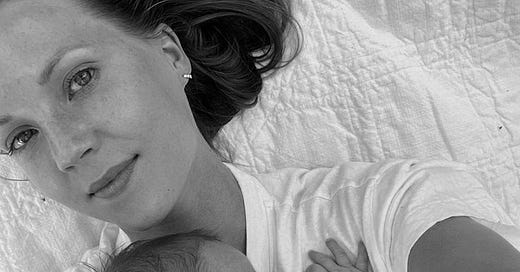Dear Reader,
Last weekend, I turned 35.
In light of this milestone, I’ve been reflecting more on aging as a woman. Perhaps it’s because I’m now officially in the mid-thirties club—or maybe because of something my brother said recently at a family reunion.
My brother Dan, ever the crass commentator, has a humor some might call offensive—but I can handle it. Maybe that’s why he saves these lines for me.
His latest offense?
“You have mom eyes,” he said.
Mom eyes? I wondered. What does that even mean?
I suppose I am a mom. Checks out.
Still, I wanted clarity. I opened my phone, scrolled through photos of me and my friends, and pointed to my beautiful sidekicks. Many of these women aren’t mothers—a strategic choice to test his theory.
“Does she have mom eyes?” I asked.
Turns out, several of my childless, carefree friends also made the cut.
So I asked: “Do you mean tired eyes?”
Dan clarified: “Basically, any woman over 28 has mom eyes.”
Ah. Apparently, once you blow out the candles on your 29th birthday, your eyes start issuing helmet reminders and bedtime snacks—even if you’ve never cared for a child in your life.
In reality, I think what he meant is: mom eyes are aged eyes.
Not the flirtatious kind that look at you across the bar in your early twenties.
In your twenties, your body is basically a collagen factory, pumping out enough to keep everything firm and bouncy. But around 25, production starts to slow down. Some say we lose about 1% of our collagen each year after that (fun).
By your thirties, you start to notice it: fine lines, a little less bounce, slightly thinner skin.
Alas—mom eyes.
I won’t argue what’s real. My eyes are a little more sunken than they used to be. Sleep deprivation shows up as darker circles—something I didn’t recognize in my twenties. Truthfully, I haven’t noticed lines around my eyes yet (maybe genetics, maybe because I’m not a squinter?), but I’m sure they’ll arrive soon enough.
Regardless: yes—my eyes have aged. Because guess what? We all age. It’s the natural consequence of living on this planet.
Honestly, I feel pretty fine with it. Most of the time.
Other times, my feelings are more complicated.
There’s a young girl within me—the young girl I’ve always been—still making peace with this transition.
Hear me out.
Recently, a friend of mine—fit, radiant, also a mom—told me she started to feel unnoticed after she turned forty.
Unnoticed. That was her word.
This is the question I ask the young girl inside me: Are you okay with not being noticed anymore?
After all, I know what it feels like to be noticed. You do too, I’m sure. The bar isn’t high. If you’re young with boobs, you’ve probably been noticed—even if you didn’t notice being noticed.
But here’s the thing: we won’t always be noticed—at least not in the same way.
Why?
Because we won’t always be able to procreate.
And maybe that’s what “mom eyes” really are. Not just fatigue or fine lines—but a subtle biological broadcast: look elsewhere.
As I turn 35, I’m thinking about that.
That soon, I won’t be noticed in that same, orgasmic primal way.
Which leads me to a deeper question: Why do I want to be noticed in the first place?
I’ve had orgasms. I’ve married, had babies. I’ve designed a home, created a brand and community, built a life rich with meaning.
Why do I still crave that primal kind of being noticed?
Maybe now, it’s time to be seen—for something greater.
And in that sense, maybe that’s what makes mom eyes beautiful.
They see the world through a new lens. A lens with more soul. A lens with less comparison, more acceptance, deeper contentment.
Getting older doesn’t mean we fade.
It means we glow brighter—in more meaningful ways.
It’s a moment to show the world—and more importantly, ourselves—just how high-vibrational we can be in a culture that wants to dismiss us.
And honestly? The women I look up to — the ones I find most attractive — are in their forties (hi, Melissa Wood), fifties (Gwyneth Paltrow goals), sixties (I met Rose-Marie Swift in person—a living beam of light), even seventies (Diane Keaton, Meryl Streep—icons forever).
So this is what I say: getting older is an opportunity to become even greater. In all ways.
To build a stronger relationship with my body, my family and community, my work and creations—and most importantly, with God.
If this is what “mom eyes” mean, I’ll wear them proudly—and shine brighter than ever before.





I've noticed mom eyes happening, and I love it. I earned them.
Mom eyes, unite!!!